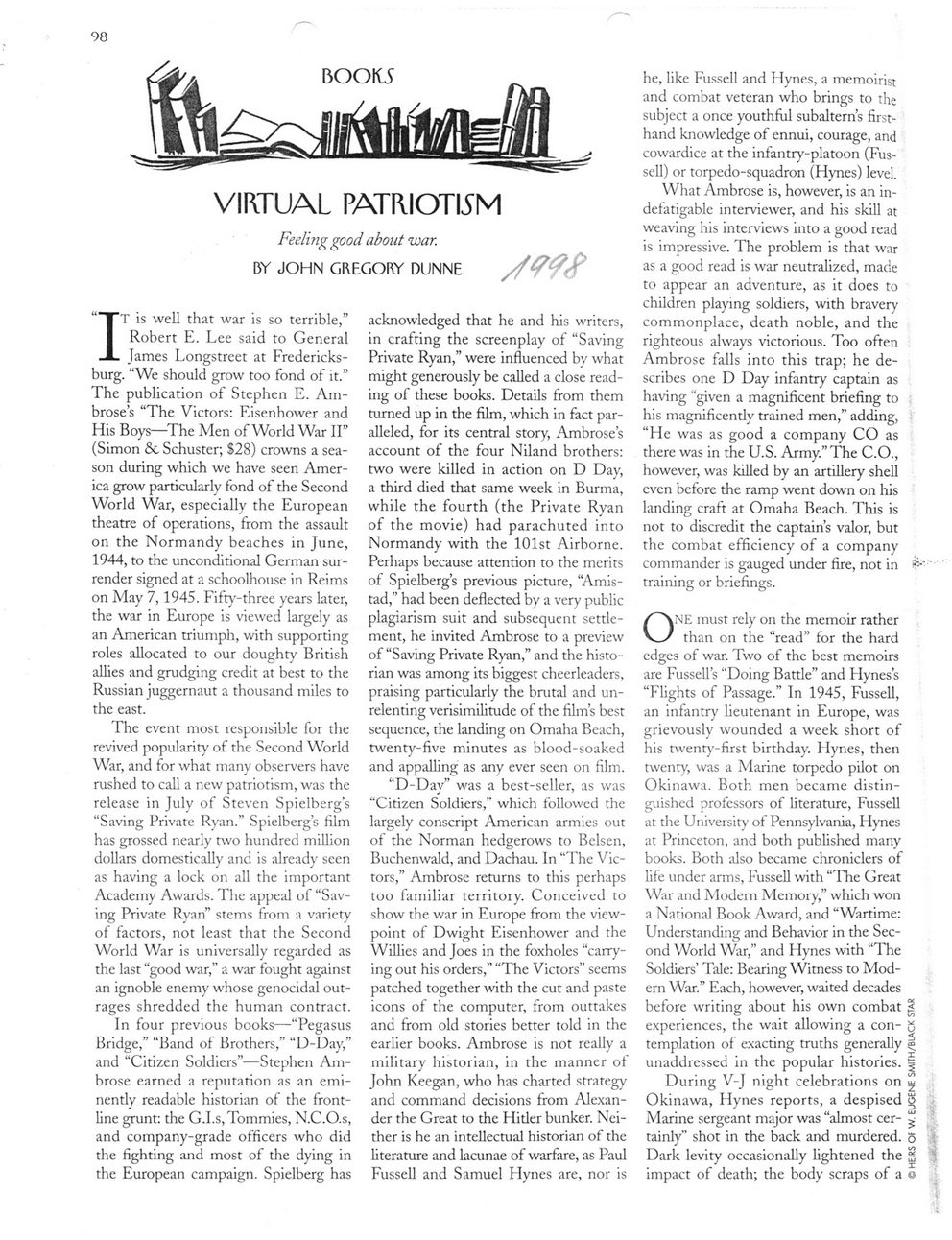This text was obtained via automated optical character recognition.
It has not been edited and may therefore contain several errors.
98 VIRTUAL PATRIOTISM Feeling good about war. BY JOHN GREGORY DUNNE IT is well that war is so terrible, Robert E. Lee said to General James Longstreet at Fredericksburg. ?We should grow too fond of it.? The publication of Stephen E. Ambrose?s ?The Victors: Eisenhower and His Boys?The Men of World War II? (Simon & Schuster; $28) crowns a season during which we have seen America grow particularly fond of the Second World War, especially the European theatre of operations, from the assault on the Normandy beaches in June, 1944, to the unconditional German surrender signed at a schoolhouse in Reims on May 7,1945. Fifty-three years later, the war in Europe is viewed largely as an American triumph, with supporting roles allocated to our doughty British allies and grudging credit at best to the Russian juggernaut a thousand miles to the east. The event most responsible for the revived popularity of the Second World War, and for what many observers have rushed to call a new patriotism, was the release in July of Steven Spielberg?s ?Saving Private Ryan.? Spielberg?s film has grossed nearly two hundred million dollars domestically and is already seen as having a lock on all the important Academy Awards. The appeal of ?Saving Private Ryan? stems from a variety of factors, not least that the Second World War is universally regarded as the last ?good war,? a war fought against an ignoble enemy whose genocidal outrages shredded the human contract. In four previous books??Pegasus Bridge,? ?Band of Brothers,? ?D-Day,? and ?Citizen Soldiers??Stephen Ambrose earned a reputation as an eminently readable historian of the frontline grunt: the G.I.s, Tommies, N.C.O.s, and company-grade officers who did the fighting and most of the dying in the European campaign. Spielberg has acknowledged that he and his writers, in crafting the screenplay of ?Saving Private Ryan,? were influenced by what might generously be called a close reading of these books. Details from them turned up in the film, which in fact paralleled, for its central story, Ambrose?s account of the four Niland brothers: two were killed in action on D Day, a third died that same week in Burma, while the fourth (the Private Ryan of the movie) had parachuted into Normandy with the 101st Airborne. Perhaps because attention to the merits of Spielberg?s previous picture, ?Amis-tad,? had been deflected by a very public plagiarism suit and subsequent settlement, he invited Ambrose to a preview of ?Saving Private Ryan,? and the historian was among its biggest cheerleaders, praising particularly the brutal and unrelenting verisimilitude of the film?s best sequence, the landing on Omaha Beach, twenty-five minutes as blood-soaked and appalling as any ever seen on film. ?D-Day? was a best-seller, as was ?Citizen Soldiers,? which followed the largely conscript American armies out of the Norman hedgerows to Belsen, Buchenwald, and Dachau. In ?The Victors,? Ambrose returns to this perhaps too familiar territory. Conceived to show the war in Europe from the viewpoint of Dwight Eisenhower and the Willies and Joes in the foxholes ?carrying out his orders,? ?The Victors? seems patched together with the cut and paste icons of the computer, from outtakes and from old stories better told in the earlier books. Ambrose is not really a military historian, in the manner of John Keegan, who has charted strategy and command decisions from Alexander the Great to the Hider bunker. Neither is he an intellectual historian of the literature and lacunae of warfare, as Paul Fussell and Samuel Hynes are, nor is he, like Fussell and Hynes, a memoirist and combat veteran who brings to the subject a once youthful subaltern?s firsthand knowledge of ennui, courage, and cowardice at the infantry-platoon (Fussell) or torpedo-squadron (Hynes) level. What Ambrose is, however, is an indefatigable interviewer, and his skill at weaving his interviews into a good read is impressive. The problem is that war as a good read is war neutralized, made to appear an adventure, as it does to children playing soldiers, with bravery commonplace, death noble, and the righteous always victorious. Too often Ambrose falls into this trap; he describes one D Day infantry captain as having ?given a magnificent briefing to his magnificendy trained men,? adding, ?He was as good a company CO as there was in the U.S. Army.? The C.O., however, was killed by an artillery shell even before the ramp went down on his landing craft at Omaha Beach. This is not to discredit the captain?s valor, but the combat efficiency of a company commander is gauged under fire, not in training or briefings. ONE must rely on the memoir rather than on the ?read? for the hard edges of war. Two of the best memoirs are Fussell?s ?Doing Battle? and Hynes?s ?Flights of Passage.? In 1945, Fussell, an infantry lieutenant in Europe, was grievously wounded a week short of his twenty-first birthday. Hynes, then twenty, was a Marine torpedo pilot on Okinawa. Both men became distinguished professors of literature, Fussell at the University of Pennsylvania, Hynes at Princeton, and both published many books. Both also became chroniclers of life under arms, Fussell with ?The Great War and Modern Memory,? which won a National Book Award, and ?Wartime: Understanding and Behavior in the Second World War,? and Hynes with ?The Soldiers? Tale: Bearing Witness to Modern War.? Each, however, waited decades before writing about his own combat experiences, the wait allowing a contemplation of exacting truths generally unaddressed in the popular histories. During V-J night celebrations on Okinawa, Hynes reports, a despised Marine sergeant major was ?almost certainly? shot in the back and murdered. Dark levity occasionally lightened the impact of death; the body scraps of a O HEIRS OF W. EUGENE SMITH/BLACK STAR

Ambrose, Stephen Virtual-patriotism-The-New-Yorker-part-1